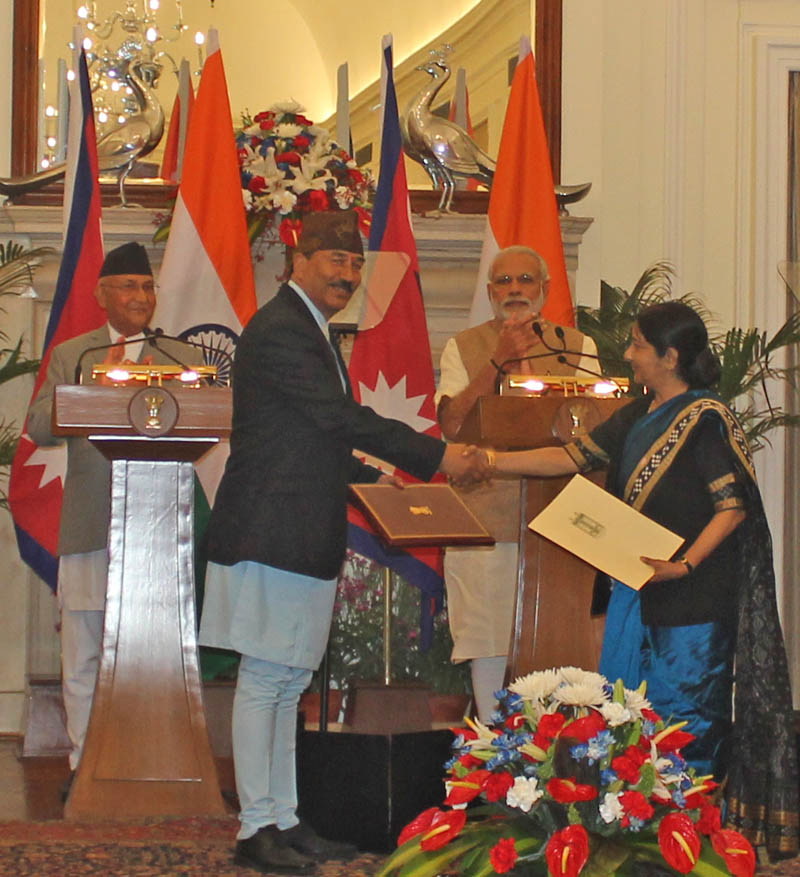Agreements signed during PM Oli's state visit to India
KATHMANDU: Nepali and Indian sides made seven different agreements during Prime Minister KP Sharma Oli's state visit to India in New Delhi on Saturday.
Nepal's Prime Minister Oli, Indian Prime Minister Narendra Modi and other top officials of both the countries witnessed the signing ceremony of the six agreements, while they jointly inaugurated the Muzaffarpur-Dhalkebar transmission line.
List of Agreements and MoUs:
1. MoU on utilisation of USD 250 million grant component of Government of India's assistance package for post-earthquake reconstruction assistance to Nepal:
Nepal's Deputy Prime Minister and Minister for Foreign Affairs and India's External Affairs Minister Sushma Swaraj signed the MoU on the grant assistance.
The MoU includes four sectors -- housing, health, education and cultural heritage have been identified. In housing, USD 100 million would be utilised for construction of 50,000 houses in 14 severely earthquake affected districts. USD 50 million each would be utilised in health, education and cultural heritage sectors in 31 earthquake affected districts of Nepal, according to India's Ministry of External Affairs.
According to Prime Minister Oli's press advisor Pramod Dahal, the agreement also includes utilisation of subsidised loan of USD 750 million
2. MoU on strengthening of road infrastructure in Tarai area of Nepal:
Secretary at Nepal's Ministry of Physical Infrastructure and Transport Arjun Kumar Karki and Indian Ambassador to Nepal Ranjit Rae signed the agreement, which will will enable speedy implementation of remaining work on 17 Roads in Package 2, 3, 4, 5 and 6 of the Tarai Road Phase-I project, totalling 518 kms. Two roads in Package 1 totalling 87 kms have already been completed.
3. MoU between Nepal Academy of Music and Drama and Sangeet Natak Academy:
Nepal's Ambassador to India Deep Kumar Upadhyay and Secretary at India's Sangeet Natak Academy Helen Acharya signed the agreement, which aims at enhancing relations between India and Nepal in the field of performing arts through exchanges of experts, exponents, dancers, scholars and intellectuals.
4. Letters of Exchange on Transit Routes:
(i) Transit between Nepal and Bangladesh through Kakadbhitta-Banglabandh corridor aims at simplification of modalities for traffic of goods between Nepal and Bangladesh while transiting through India, through the Kakadbhitta (Nepal) and Banglabandha (Bangladesh) corridor.
(ii) Operationalisation of Vishakhapatnam Port would provide transit facilities for Nepal through the Vishakhapatnam port.
5. Letters of Exchange on Rail Transport:
(i) Rail transport to/from Vishakhapatnam would allow rail transport to and from Vishakhapatnam to Nepal.
(ii) Rail transit facility through Singhabad for Nepal’s Trade with and through Bangladesh would help operationalise rail transit facility through Singhabad in India for Nepal’s trade with and through Bangladesh.
6. Inauguration of Muzaffarpur-Dhalkebar transmission line [Initial supply of 80 MW, to be augmented to 200 MW by October 2016 and 600 MW by December 2017]
The Nepal portion of the 400 KV Muzaffarpur-Dhalkebar transmission line is being implemented by Government of Nepal, under an LoC of USD 13.5 million. 80 MW power would flow immediately through this line, with an initial charge of 132 KV. Thereafter, it will be augmented to 200 MW in October 2016 at 220 KV, and then to 600 MW by December 2017 at 400 KV.
7. Establishment of Eminent Persons Group
At the third meeting of the India-Nepal Joint Commission held at Kathmandu in July 2014, it was decided to establish an Eminent Persons Group (EPG). The EPG comprises eight members with each country nominating four members, preferably a parliamentarian, a lawyer, an economist and a civil society activist. The EPG has now been constituted. Its mandate would be to comprehensively review bilateral relations and recommend measures including institutional frameworks to further enhance bilateral ties.
Nepal had already formed the EPG comprising of Rajan Bhattarai, Bhekh Bahadur Thapa, Suryanath Upadhyay and Nilamber Acharya.
The Indian side too announced its EPG which includes Bhagat Singh Koshyari, Mahendra Lama, Jayant Prasad and BC Upreti .
READ ALSO:
Nepal, India PMs pledge to strengthen ‘historic ties’ clearing recent hiccups






